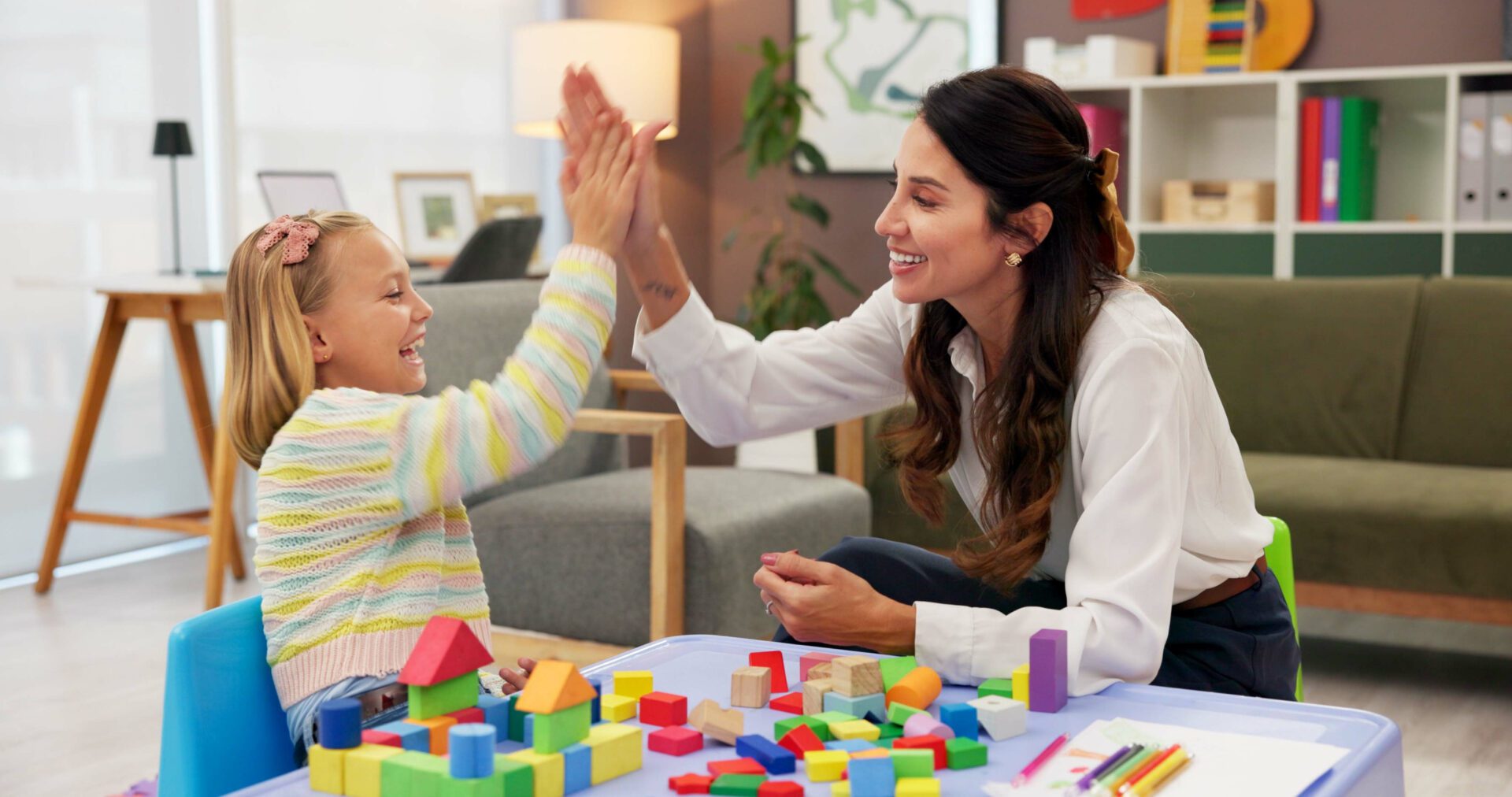
- Occupational therapists help children on the autism spectrum build daily life skills like dressing, eating, and following routines by teaching self-care, coordination, sensory regulation, and social interaction through hands-on activities.
- Therapists design personalized sessions that use repetition, visuals, and real-life practice to help children grow in confidence and independence. Families support this growth by practicing skills at home.
- Children gain lasting benefits as they become more independent, confident, and able to participate in daily routines. The team at Abbott & Burkhart Therapy guides families through every step of this progress.
Raising a child on the autism spectrum brings many questions. One of the most common concerns for parents is how to help their children with daily life activities. Simple tasks like brushing teeth, dressing, or playing with others may seem overwhelming for some children. When those challenges affect daily routines, it’s natural to seek support.
Occupational therapy is one approach that can help. It focuses on improving the skills your child needs to participate in everyday life. Through a structured and supportive process, children can build confidence and function more independently. Understanding how occupational therapy works can help you take the next step toward meaningful progress.
What Is Occupational Therapy?
Occupational therapy helps children become more independent by working on tasks they encounter in daily life. For children with autism, this often includes self-care activities, fine motor skills, and play skills. Therapy sessions are guided by trained professionals who assess each child’s needs and create personalized goals tailored to their specific needs.
The therapist will assess how your child handles tasks such as holding a spoon, writing with a pencil, or playing with others. These tasks might seem small, but they are important steps in building confidence and participation. Many children benefit from consistent, structured support to build these skills over time.
Why Daily Life Skills Matter for Children with Autism
Life skills are the foundation of independence. They help your child feel more confident in their daily environment, whether at home, in school, or out in the community. When these skills are delayed or difficult to learn, your child might struggle with routine activities that other children seem to manage easily.
Common challenges may include:
- Getting Dressed Without Help
- Using Utensils During Meals
- Tying Shoelaces
- Managing Transitions Between Tasks
- Following Multi-Step Instructions
You might notice that your child avoids these tasks or becomes frustrated. This can lead to stress, emotional outbursts, or resistance to change. With occupational therapy, your child can learn at their own pace while receiving support that is patient, targeted, and encouraging.
Common Life Skills Addressed in Occupational Therapy
Occupational therapy targets a wide range of skills. Each child has different needs, but some areas are commonly addressed for those on the autism spectrum. The therapist works closely with families to identify priorities and build a plan that supports long-term success.
Self-Care Skills
These include basic daily routines like:
- Brushing Teeth
- Washing Hands
- Getting Dressed
- Using the Bathroom
- Feeding Themselves
If your child avoids or struggles with these tasks, therapy can help them practice in a safe and supportive way. For example, a therapist might break the task into smaller steps, using visuals and repetition until your child feels comfortable doing it independently.
Motor Planning and Coordination
Some children on the spectrum have difficulty with planning and coordination. This can affect how they move their bodies during activities like running, jumping, writing, or using scissors. A therapist can help your child improve control and coordination through exercises that build strength, balance, and motor awareness.
Sensory Processing
Children with autism often respond to sensory input differently. Some may be sensitive to sound or texture, while others seek out movement or pressure. These sensory preferences can affect how your child eats, plays, or handles daily routines. Therapy helps them regulate these responses and stay calm and focused during activities.
Social and Play Skills
Playing with others can be hard for some children. They may not know how to start a conversation, take turns, or share toys. Occupational therapy offers structured opportunities to practice these interactions. Through guided play, your child learns how to engage with peers and build relationships.
How Therapy Sessions Work
Every occupational therapy session is tailored to your child’s needs. The therapist begins by assessing your child’s current abilities and challenges. They may use observation, standardized tools, or direct interaction. This helps create a plan with clear, achievable goals.
Structured Yet Flexible Approach
Therapists use routines to make sessions predictable and comfortable. Activities might include puzzles, crafts, obstacle courses, or real-life simulations like packing a backpack. The goal is to practice important tasks in a way that feels fun and engaging.
Step-by-Step Learning
Complex tasks are broken down into smaller, manageable steps. For example, if your child is learning to put on a jacket, they might first practice holding the zipper, then pulling it up partway, and eventually doing it fully on their own. This gradual process supports learning without overwhelming the child.
Hands-On and Visual Learning
Therapy often includes visual aids, hand-over-hand support, and repetition. These tools help reinforce learning, especially for children who benefit from seeing and doing rather than just hearing instructions.
The Role of Family in Occupational Therapy

Parents and caregivers are an important part of therapy. Your involvement helps reinforce what your child learns during sessions and brings those skills into daily life. The therapist may suggest simple activities to practice at home, using common items and routines.
You might be asked to:
- Practice hand washing before meals
- Set up a dressing station with visual cues
- Use a checklist for morning routines
- Try new foods together in a relaxed setting
- Play games that encourage turn-taking
These home-based activities help bridge the gap between therapy and real life. They also give you tools to support your child in a way that feels natural and achievable.
Signs Your Child May Benefit from Occupational Therapy
Every child develops differently, but some signs may indicate your child could benefit from extra support. If you notice the following behaviors, it might be time to consider an evaluation:
- Difficulty with fine motor tasks like writing, buttoning, or cutting
- Delayed self-care skills for their age
- Strong reactions to sensory input (avoiding textures, covering ears)
- Resistance to change in routine or environment
- Trouble with body awareness, coordination, or balance
- Avoidance of group play or challenges in social situations
Early support can make a big difference. Therapy can reduce frustration and improve your child’s ability to take part in family routines, school tasks, and social activities.
Making Progress Beyond the Therapy Room
Therapy doesn’t stop when the session ends. Progress continues through consistent routines, practice, and support at home and in the community. You don’t need special tools or training—just a willingness to encourage your child and celebrate each step forward.
Here are ways you can support ongoing growth:
- Keep Routines Predictable
- Encourage Independence During Self-Care
- Use Positive Language During Challenges
- Break Tasks Into Small Steps
- Offer Choices to Promote Engagement
Even small improvements matter. When your child learns to zip their jacket or share a toy, it builds confidence that carries over to the next task. Therapy helps your child reach these moments one step at a time.
Addressing Emotional and Sensory Challenges
It’s not just about physical tasks. Many children with autism face emotional hurdles that affect their participation. Occupational therapy includes strategies to help children recognize their feelings and respond in healthy ways.
A therapist might use calming tools like weighted blankets, visual timers, or movement breaks to help your child stay focused. They may also teach strategies for handling frustration, such as using words instead of tantrums or asking for help when needed. When your child feels more in control, they are more open to learning and trying new things.
Long-Term Benefits of Occupational Therapy
The progress your child makes in therapy extends beyond early childhood. As they grow, the skills they build create a strong foundation for future learning, social success, and independence. Children who receive consistent occupational therapy often:
- Manage personal care with less help
- Participate more actively in group settings
- Handle transitions with fewer disruptions
- Show greater confidence in social interactions
- Adapt more easily to new environments
These long-term changes can shape your child’s experience in school, friendships, and family life. Each goal reached in therapy becomes a stepping stone to greater independence.
Choosing the Right Therapist
Finding the right occupational therapist is important. You want someone who understands your child’s needs and works in partnership with your family. At AB Therapy, therapists take time to get to know your child, create realistic goals, and adjust strategies as needed.
You’ll be involved every step of the way. Open communication between parents and therapists helps create a shared plan that fits your child’s pace and strengths. Whether sessions happen in a clinic or at home, your child will receive support that is structured, caring, and personalized.
Ready to Help Your Child Build Daily Life Skills?
Occupational therapy can help your child gain the skills they need to thrive. Whether it’s putting on shoes, joining in play, or staying calm during transitions, these small wins matter. With the right guidance and consistent support, children on the autism spectrum can learn, grow, and take on everyday tasks with more confidence.
At Abbott & Burkhart Therapy, we offer personalized occupational therapy that fits your child’s pace and needs. Our therapists work with families to support progress across self-care, play, sensory challenges, and more. Let us walk this journey with you. Reach out today to learn how we can support your child’s development.

